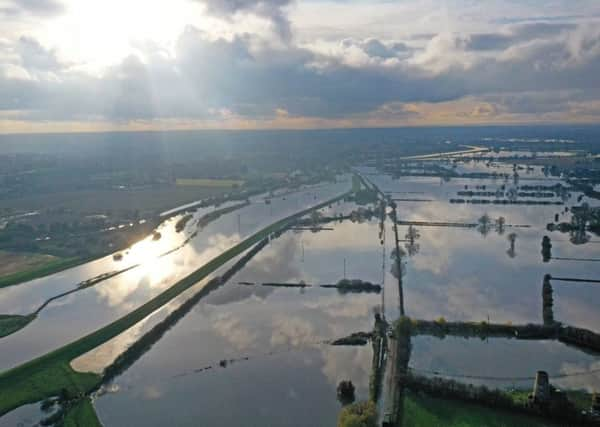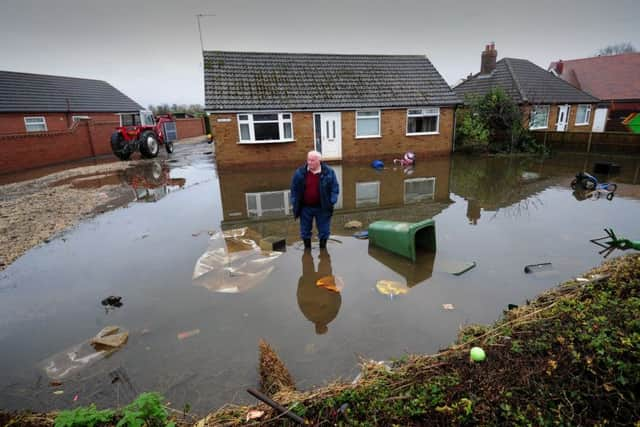Don’t allow building on flood plains if Yorkshire to be spared future disasters – Yorkshire Post Letters


AS a former teacher of geography, the recent coverage by The Yorkshire Post of the serious floods in South Yorkshire has provoked a certain professional interest as to the causes.
Advertisement
Hide AdAdvertisement
Hide AdA part of the A-level course I taught brought together elements of meteorology and urban growth. My students studied the relationships between rainfall incidents and river water level. Simple line graphs revealed the speed and intensity of the rise and fall of river levels in different locations.


The graphs for largely rural areas revealed a slow rise in river levels as rainfall reached the river largely through ground flow and the falling line of the graph extended through a substantial time period. However, the picture in largely urban areas showed a very different graph, with a steep rise in the river level and then a similar steep fall over a short period of time.
The principal reason for the difference with the urban area graph seemed to be largely the result of rapid channelling of the water via drains and culverts. Much less water reached the river through ground flow because of much of the land having being covered by an impermeable surface of concrete and Tarmacadam. Exacerbating the rapid run-off in urban areas was the increasing tendency of homeowners to pave or concrete front garden areas to provide parking for a growing number of vehicles.
Advertisement
Hide AdAdvertisement
Hide Ad

It would be an over-simplification to attribute all flood incidents and their avoidance solely to urbanisation. A holistic approach is necessary, involving management of the whole catchment area of the river. Thus the amount of tree cover, the efficiency and speed of the river channel to carry water, and the long profile of the river, must all be considered along with management of urbanisation. Above all, future location of buildings in a river’s flood plain should be avoided. The clue is in those two words – ‘flood plain’.
From: Patrick Sleigh, Inverurie, Aberdeenshire.
WITH the floods in South Yorkshire highlighting the reluctance of the various environmental agencies to allow farmers and contractors to dredge, it is little wonder why people are getting annoyed. They should worry less about water voles etc – worry more about people’s property and livelihoods. I also suggest that Scotland and England’s rural communities should be working together to overturn this politically.
From: Dave Croucher, Pinfold Gardens, Doncaster.
I WOULD like to thank the great people who rushed to help Fishlake at this time, from the local farm lads who worked non-stop day and night ferrying villagers to safety with their tractor/trailers and four-wheel drives to the firemen who came from as far away as the North East, West Midlands and Wales, and the South Yorkshire police officers who have guarded our homes day and night.
Advertisement
Hide AdAdvertisement
Hide AdTo all the people from all parts of the country who have sent food and clothing, the above are the type of citizens that the CBE and MBE awards should be going to, not those that have achieved great wealth for themselves by doing their jobs. Theirs was achieved for purely selfish reasons, not selfless ones.
From: John N Duckitt, Sykehouse.
I AGREE with Sue Warkup’s letter (The Yorkshire Post, November 14) – dredging rivers and dykes is the obvious way to clear flood water, though the Environment Agency still maintain dredging the lower reaches of the River Don would not have helped to alleviate the flooding in Fishlake and Sykehouse.
When the Yorkshire Ouse Catchment Board was formed in the 1930s, they started to improve the flow rate of the River Don by dredging the silt, letting it dry out and then using it to build the river banks four feet higher all the way from Goole to Doncaster. The terrible flooding over the past week was caused by the River Don over-topping its banks and not by breaches in the banks. Great credit must be given to Yorkshire Ouse Catchment Board for creating riverbanks which have stood the test of time.
From: Peter Rickaby, Selby.
CLIMATE change supporters of Extinction Rebellion are happy to block roads into York on a pointless exercise, but nowhere to be seen offering practical help to residents flooded out of their homes in the village of Fishlake.
From: Jeff Lewis, Wood Grove, Whitefield.
Advertisement
Hide AdAdvertisement
Hide AdSIR Bernard Ingham (The Yorkshire Post, November 13) says the Government should live within its means, as he does.
Unlike an individual, the Government has the ability and the responsibility to determine, within wide limits, what its means are to be. That is what the budgets etc. are about.
He then jumps to bashing the environmental concerns of our politicians.
He sees expressions of concern about the environment as a trick to wreck the capitalist system, going on to refer to the “Marxist/Communist states” like Russia and China.
Advertisement
Hide AdAdvertisement
Hide AdI’ve got news for Sir Bernard – the Russians ditched the Marxist/Communist system over quarter of a century ago, and while the Chinese Communist Party still holds sway, it has allowed a significant private sector in its economy.
Their get out of jail free card, he thinks, is nuclear power, but this is something which much of the rest of the world has. He might do well to study the findings of climate science a bit more, and could do worse than look at the article on fracking by Dr Simon Sweeney which appeared in the same edition.